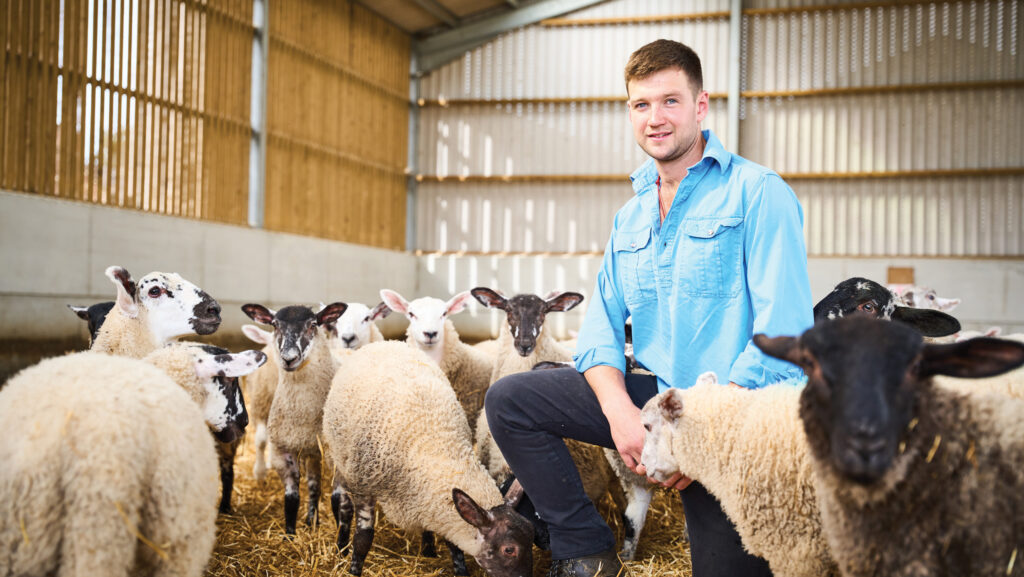Farmers Weekly Awards 2025: Sheep Farmer of the Year
 Tom Bird, Farmers Weekly Awards 2025 Sheep Farmer of the Year © Oli Lees
Tom Bird, Farmers Weekly Awards 2025 Sheep Farmer of the Year © Oli Lees Tom Bird of Ferry Lane Farms, Derbyshire is the winner of Farmers Weekly Awards 2025 Sheep Farmer of the year.
Each day, Tom Bird reminds himself of the old army saying: proper planning prevents piss-poor performance. It is the most important lesson he has learned.
With an average of 1.75 lambs reared from his flock of 2,300 North Country Mules, and farmland spanning 30 miles, anything less than meticulous planning for his high-input, high-output system could easily end in chaos.
See also: FW Awards: Meet the 2025 Sheep Farmer of the Year finalists
Farm Facts
Ferry Lane Farms, Derbyshire
- 162ha owned and 342ha rented, plus winter grazing of grass and cover crops; growing 311ha permanent pasture/improved grass; 137ha arable cropping; 56ha in environmental schemes
- 2,300 North Country Mules
- Flock replacements bought in
- Suffolk, Texel, Charollais and Suffolk cross Texel rams
- Finished lambs sold to Tesco (Tesco Sustainable Lamb Group premium)
- 40-70ha mown for hay, some sold; 25ha cut for silage
Yet Tom, who farms in partnership with his father, William, and a team of self-employed staff, also has to be flexible.
The predominantly light land at Ferry Lane Farms is prone to burning up in late spring and summer unless there is adequate rainfall.
And in winter, more than 200ha of the farm is flooded by the Rivers Trent and Derwent.
Such a balancing act is not for the fainthearted. But the 29-year-old has what it takes.
“Always having an open mind and being willing to change the plan of attack is critical for our business,” he says.
Tom’s mobile handling system is the perfect illustration of his organisational skills.
He regards the purpose-built, walk-through trailer, with all equipment to hand and under cover, as indispensable for his scale of operation.
Feed and nutrition
Lambing is indoors from early March, and the aim is to lamb 80% of the flock in three weeks, with help from 10 or more students each year.
Attention to detail is paramount to keep newborn lambs healthy. This includes measuring each ewe’s colostrum quality and topping up from a ewe with spare when needed.
About 7ha of fodder beet are grown annually in the arable rotation and fed in situ if winter grazing is in short supply.
Otherwise, the beet is lifted and fed to ewes post-lambing for three weeks alongside 450g/day of concentrate and good-quality grass.
This fills any forage gap and brings them to peak lactation to give their lambs the best start.
Four to six weeks after lambing, sheep are put in grazing groups of 150-200 ewes plus lambs, with the first 70% of lambs born creep fed to benefit from a high feed conversion ratio.
This ensures most are finished by July – average days to slaughter is 14-15 weeks – mitigating the risk of drought, and hitting the market before prices start to fall.
Flock performance
Tom takes regular faecal egg counts in the grazing season, monitoring daily liveweight gain, and buying performance-recorded tups to lift killing out percentage and growth rates.
“Higher meat yield and better growth rates are crucial for the business; the fewer days on farm the better, as this increases profit margin,” he says.
This also reduces the farm’s carbon footprint. Some 86% of lambs hit weight specification of 21kg deadweight.
Next, Tom plans to move field data onto a cloud-based system.
He also recently invested in an automated sheep handling system with weigh head and electronic identification reader, along with dosing guns that administer treatments based on exact weight.
Winning ways
- Clear business focus and commitment to efficiency, resulting in a resilient and high-performing sheep system
- Organised yet flexible approach to management
- Excellent stockmanship and close relationship with vets for optimum flock health
- Good grassland management in challenging conditions
- Collaboration securing grazing on rented land
What the judges say
“Tom’s organisational skills and flexible approach, combined with impressive levels of stockmanship and knowledge of flock nutrition, have resulted in a resilient and productive sheep system that is fit for the future.”
The other finalists
- James Horn, J Horn Agricultural Services, Northamptonshire
- Dan Pritchard, JR & DJ Pritchard, Gower Peninsula
The Farmers Weekly 2025 Sheep Farmer of the Year Award is sponsored by Nettex and Rumenco

The Farmers Weekly Awards celebrate the very best of British agriculture by recognising hard-working and innovative farmers across the UK.
Find out more about the Awards, the categories and sponsorship opportunities on the Farmers Weekly Awards website.
